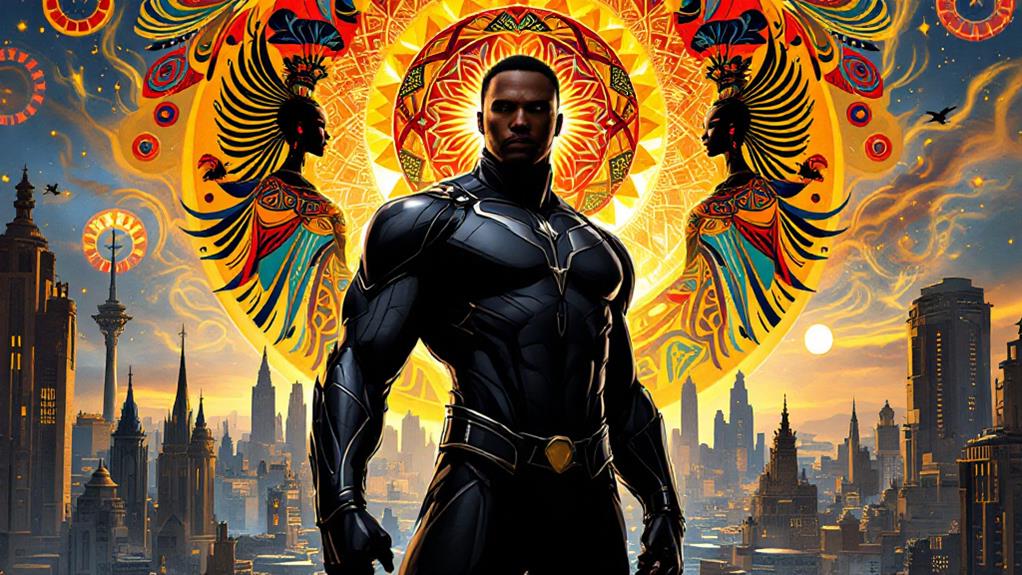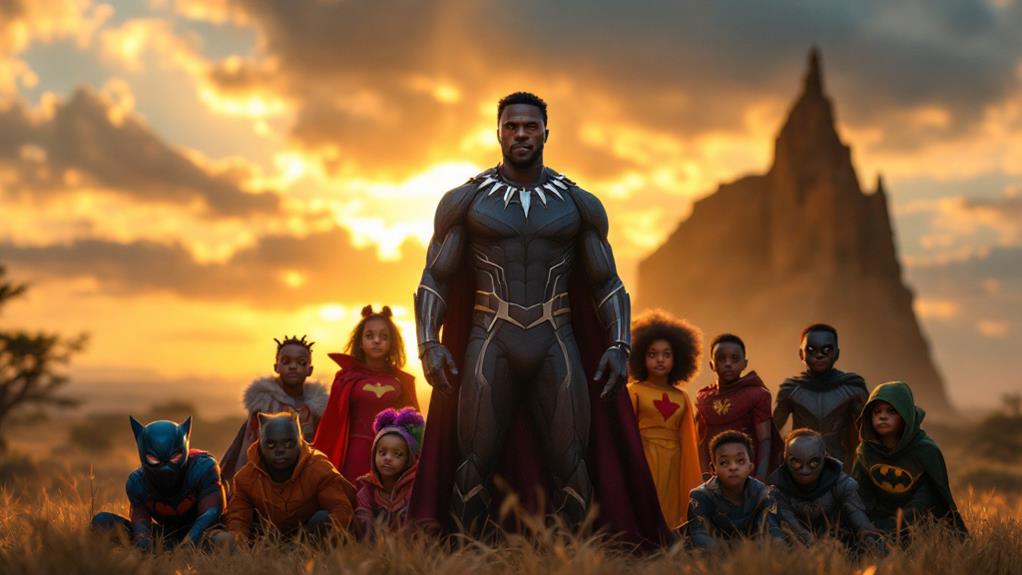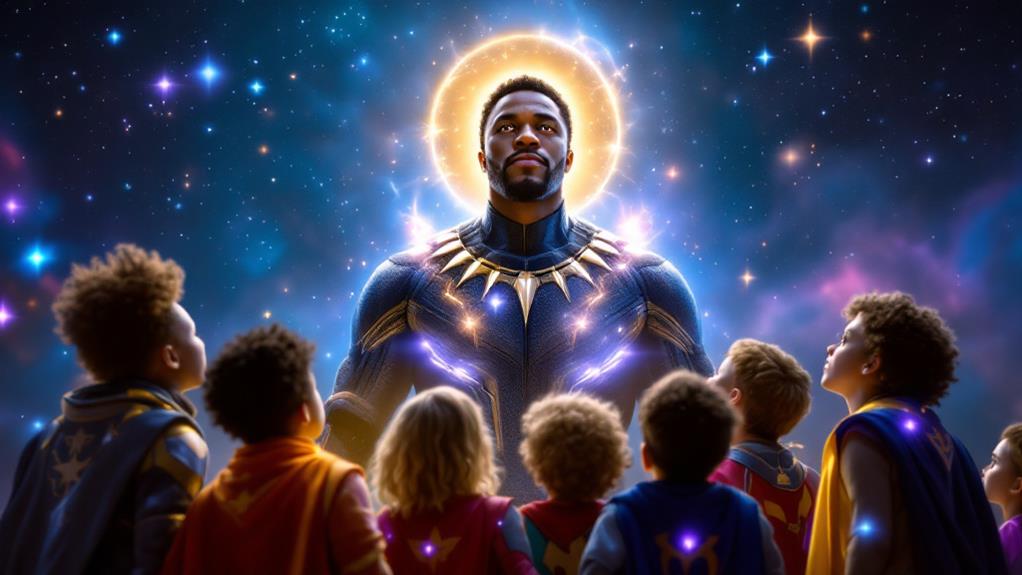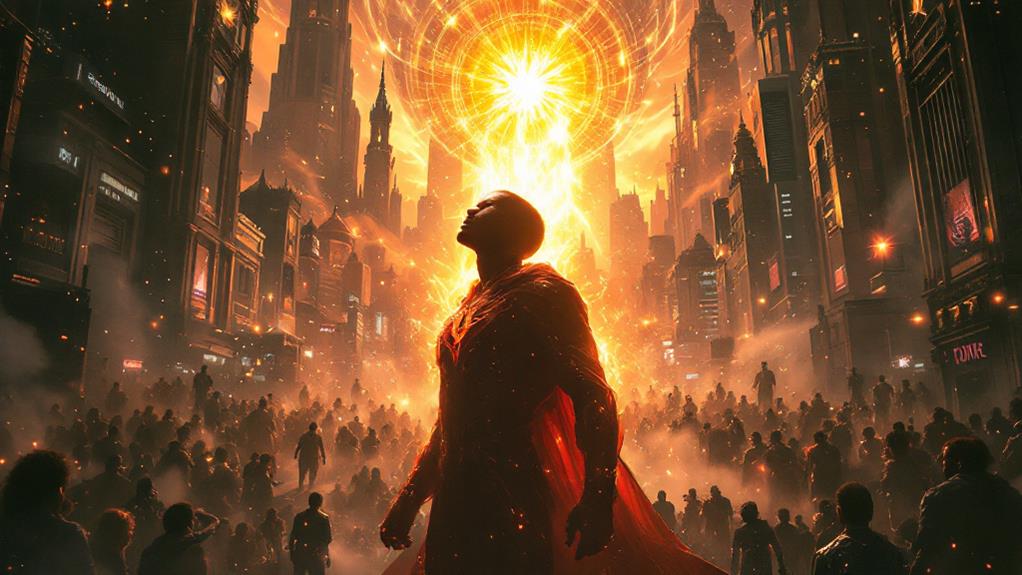When you think of Chadwick Boseman, his role as T'Challa in "Black Panther" likely springs to mind—a character that did more than entertain; it changed the narrative around Black superheroes. Boseman didn't just play a hero; he became a symbol of dignity and cultural pride that challenged Hollywood's long-standing stereotypes. His portrayal paved the way for more authentic Black representation in cinema. But how exactly did his work inspire future generations? And what lasting influence does his legacy have on the film industry today? Consider how Boseman's vision continues to shape the stories we see on screen.
Pioneering Role in Black Panther

In the groundbreaking film "Black Panther," Chadwick Boseman played a pioneering role that reshaped the portrayal of Black superheroes in mainstream cinema. As T'Challa, Boseman brought to life a character that wasn't only powerful and noble but also deeply connected to his culture and heritage.
You saw a superhero who was multifaceted, leading a technologically advanced nation with wisdom and grace. This role was crucial because it wasn't just about heroics; it was about representation and authenticity.
Boseman's portrayal made you see a Black superhero who was the central figure in a story that celebrated African culture and identity. He didn't just fight villains; he represented a leader with a rich backstory, rooted in a world that combined tradition with innovation.
With every scene, Boseman infused T'Challa with dignity, making you realize how essential it was to have such a character on the big screen. His performance in "Black Panther" wasn't just about action sequences; it was about the humanity and depth he brought to T'Challa.
You witnessed a role that went beyond entertainment, serving as a beacon for change in how Black characters are depicted in cinema.
Breaking Hollywood Stereotypes
Shattering long-standing Hollywood clichés, Chadwick Boseman's role in "Black Panther" challenged the industry's narrow portrayal of Black characters. When you think about traditional Hollywood films, Black characters often fall into limited roles—sidekicks, villains, or comic relief. Boseman, however, took on the mantle of T'Challa, a king and superhero who embodies dignity, intelligence, and strength.
This wasn't just a departure from the norm; it was a bold statement that Black characters can and should be multifaceted, leading heroes rather than supporting roles.
By stepping into this groundbreaking role, Boseman not only entertained but also educated audiences about African culture and history. You see, T'Challa wasn't just a superhero; he was a leader of a technologically advanced African nation, Wakanda.
This portrayal subverted the usual stereotypes of Africa as underdeveloped and impoverished. Instead, it offered a vision of prosperity and capability.
In doing so, Boseman set a new standard. As a viewer, you couldn't ignore the powerful message that Black characters deserve complexity and depth.
He paved the way for more diverse storytelling, urging Hollywood to re-evaluate its outdated tropes and create narratives where everyone sees themselves as heroes.
Impact on Black Representation

Chadwick Boseman's unforgettable portrayal of T'Challa didn't just break stereotypes; it redefined Black representation in cinema. You see, Boseman took on a role that transcended traditional narratives, presenting a Black superhero as a regal, complex leader rather than a sidekick or villain.
By doing so, he opened doors for more nuanced portrayals of Black characters, challenging Hollywood to embrace diverse stories. His performance in "Black Panther" showed audiences worldwide the power and influence of Black-led films. You couldn't help but feel the significance of Wakanda—a rich, technologically advanced African nation—challenging preconceived notions and stereotypes.
This portrayal encouraged filmmakers to feature Black characters in more central, authoritative roles, ultimately expanding opportunities for Black actors and creators. Boseman's impact didn't stop at the screen. His work inspired you and others to demand more from Hollywood, advocating for authentic representation.
The success of "Black Panther" proved that stories centering around Black experiences aren't only commercially viable but also deeply resonant. By embodying T'Challa with dignity and strength, Boseman left a lasting legacy, urging you to continue pushing for equitable representation in all media forms.
Cultural Significance and Influence
Beyond the silver screen, Chadwick Boseman's portrayal of T'Challa in "Black Panther" left an indelible mark on global culture. When you watched Boseman embody the African king, you saw a superhero who wasn't just fighting villains but also challenging stereotypes. His performance gave audiences an authentic representation of African royalty and culture, and it resonated deeply. You felt the pride and dignity that T'Challa exuded, and it was contagious.
This wasn't just another superhero movie; it was a cultural celebration that reached far beyond the boundaries of Wakanda.
Boseman's influence extended beyond fans and moviegoers. His portrayal became a cultural touchstone that sparked conversations about race, identity, and empowerment. You might've noticed how "Black Panther" inspired fashion, music, and art, all embracing African heritage with newfound pride.
The film's success demonstrated the universal appeal of diverse stories and characters, challenging Hollywood to rethink its approach to representation.
In essence, Chadwick Boseman didn't just play a role; he became a symbol of cultural pride and progress. His impact encouraged you to embrace your roots, pushed society to celebrate diversity, and highlighted the importance of authentic representation in media.
Inspiring Future Generations

Witnessing Chadwick Boseman's legacy unfold, you can't help but see how his portrayal of T'Challa is inspiring future generations. As Black Panther, Boseman offered young people a hero who looked like them, embodying strength, intelligence, and leadership. He showed that superheroes aren't confined to one narrative, breaking stereotypes and broadening representation. Kids now dream of being like T'Challa, not just for his powers, but for his integrity and wisdom.
In classrooms and communities, Boseman's influence resonates. Teachers and mentors use his story to teach resilience and ambition. Students see his journey from humble beginnings to global stardom as a reflection of hard work and dedication. Boseman's roles, especially T'Challa, remind them they can aspire to greatness regardless of their background.
Moreover, his off-screen life offers lessons in humility and purpose. Boseman's commitment to charitable work and his battles with personal adversity teach young people about courage and empathy. By embracing these values, they learn to face their own challenges with grace.
Fundamentally, Chadwick Boseman has become a beacon for aspiring generations, urging them to dream bigger and redefine possibilities for themselves.
Boseman's Legacy in Film
You see Boseman's profound impact extend beyond the personal and into the world of film. His performances consistently broke barriers and challenged stereotypes.
In roles such as Jackie Robinson, James Brown, and Thurgood Marshall, he brought depth and dignity to historical figures, showing the world the richness of Black history through cinema. His portrayal of T'Challa in "Black Panther" wasn't just about donning a superhero suit; it was about embodying a cultural icon that resonated with audiences globally.
Boseman's work redefined what it meant to be a leading man in Hollywood. He chose roles that reflected his values and pushed the industry towards a more inclusive representation.
His performances were more than just entertainment; they were statements about identity, heritage, and resilience. He showed filmmakers and audiences alike that diverse stories could achieve both critical acclaim and box office success.
Continuing His Vision

Frequently, when a trailblazer like Chadwick Boseman leaves a profound legacy, others step up to continue their work and amplify their impact. You can see this in the way filmmakers, actors, and fans carry forward his vision for diverse, impactful storytelling. By supporting films that highlight Black superheroes and their stories, you contribute to a movement Boseman championed.
Directors and writers, inspired by Boseman's work, are creating narratives that reflect the complexities and strengths of Black characters, guaranteeing they're not just sidekicks or stereotypes.
You can also play a role by advocating for and celebrating Black talent both in front of and behind the camera. Support initiatives that aim to increase representation in the film industry. Encourage studios to invest in stories that challenge norms and offer fresh perspectives. By doing so, you're helping to guarantee Boseman's vision thrives.
Attend film festivals, join conversations around representation, and share these stories with others. Each action you take helps solidify a space where diverse voices can flourish.
In continuing Boseman's vision, you're not just honoring his legacy; you're paving the way for future generations of storytellers and audiences.
Conclusion
You've seen how Chadwick Boseman redefined Black superheroes with his iconic role as T'Challa in "Black Panther." By breaking Hollywood stereotypes, he paved the way for authentic Black representation in film. His cultural significance and influence continue to inspire future generations, encouraging them to embrace and celebrate diversity in storytelling. Boseman's legacy lives on, urging you to advocate for richness in Black narratives and ensuring his vision for inclusive cinema endures.


